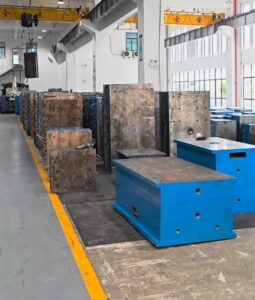In the modern manufacturing landscape, molds play a pivotal role in shaping products across various industries, from automotive to consumer goods. Efficient mold management is crucial for maintaining production efficiency, reducing downtime, and controlling costs. però, traditional mold management methods often face challenges such as inaccurate inventory tracking, time-consuming manual inspections, and difficulty in real-time monitoring. Fortunatamente, the innovative application of Radio Frequency Identification (RFID) technology is revolutionizing mold management, bringing about a new era of precision and productivity.
RFID technology utilizes radio waves to identify and track objects equipped with RFID tags. These tags can store relevant information about the mold, such as its type, Indicazioni, usage history, and maintenance records. When applied to mold management, RFID offers several key advantages that address the limitations of traditional methods.
1.One of the primary benefits is seamless inventory management
In a manufacturing facility, there can be a vast number of molds, each with different characteristics and uses. Manually counting and recording each mold is not only prone to errors but also extremely time-consuming. Con RFID, workers can quickly scan multiple molds at once using handheld or fixed readers. The system automatically updates the inventory database, providing real-time visibility into the location and status of each mold. This eliminates the need for tedious manual checks and ensures that the inventory is always accurate and up-to-date.
Per esempio, a large automotive parts manufacturer was able to reduce its mold inventory counting time by 80% after implementing RFID, allowing staff to focus on more value-added tasks.
2.Real-time tracking is another significant advantage
Molds are often moved between different production lines, storage areas, or even external facilities for maintenance or repair. Keeping track of their exact location at all times is essential for optimizing production schedules and preventing losses.
RFID tags enable continuous monitoring of mold movements. Each time a mold passes through a reader installed at key points such as production line entrances, exits, or storage room doors, its location is recorded and transmitted to the central management system. This allows managers to quickly locate any mold when needed, minimizing the time wasted in searching for misplaced or lost items.
In a plastics manufacturing plant, this real-time tracking feature reduced mold retrieval time from an average of 30 minutes to just 5 minuti, significantly improving overall production flow.
 3.Maintenance and lifecycle management are also enhanced by RFID technology
3.Maintenance and lifecycle management are also enhanced by RFID technology
Each mold has a specific lifespan and requires regular maintenance to ensure optimal performance. By storing maintenance history and schedule on the RFID tag, the system can automatically generate alerts when a mold is due for maintenance or when it has reached the end of its useful life. This proactive approach helps prevent unexpected breakdowns during production, which can cause costly delays.
Inoltre, the data collected from RFID tags can be analyzed to identify patterns in mold wear and tear, allowing manufacturers to optimize their maintenance strategies and extend the lifespan of their molds.
A furniture manufacturing company saw a 30% reduction in mold-related production downtime after implementing RFID-based maintenance management.
The implementation of RFID technology in mold management also brings about improved traceability and quality control. Every time a mold is used in production, the RFID system can record details such as the production batch, operating conditions, and any quality issues encountered. This detailed traceability helps in identifying the root cause of quality problems and taking corrective actions promptly. It also ensures compliance with industry standards and regulations, as all relevant data can be easily accessed and audited.
Conclusione
RFID technology is transforming mold management by providing efficient inventory tracking, real-time location monitoring, proactive maintenance, and enhanced traceability.
As manufacturing continues to evolve towards greater automation and intelligence, the innovative application of RFID is set to become an indispensable tool for businesses aiming to stay competitive in the global market. By leveraging this technology, manufacturers can streamline their operations, Riduci i costi, and improve overall productivity, making mold management more efficient and reliable than ever before.






